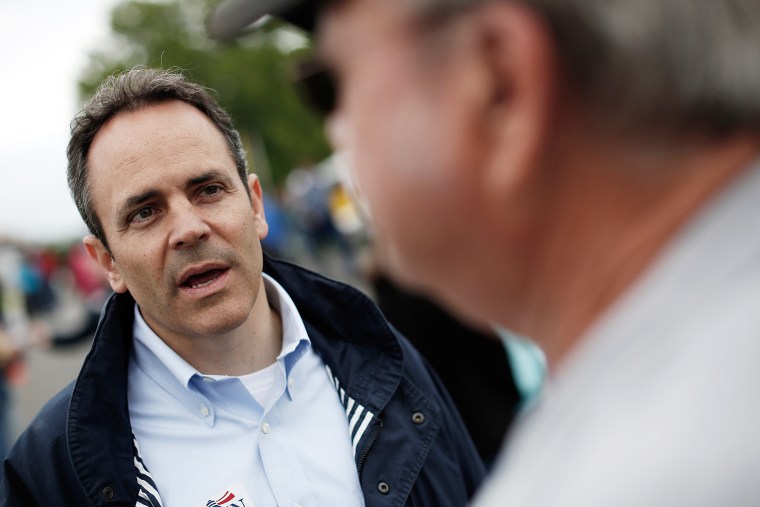On Monday night, Donald Trump traveled to Kentucky for a campaign rally intended to benefit one man: Gov. Matt Bevin (R). The president told the unpopular governor, on the eve of his re-election bid, "[I]f you lose, they're going to say, 'Trump suffered the greatest defeat in the history of the world. This was the greatest.' You can't let that happen to me."
Yeah, about that....
Kentucky Attorney General Andy Beshear pulled off an upset Tuesday night in an apparent victory over Republican Gov. Matt Bevin, dealing a blow to President Donald Trump, NBC News projects. [...]In Kentucky, Trump couldn't save the unpopular Bevin after campaigning with him the night before the election in Lexington, where the president told supporters a loss by the GOP governor would be portrayed as Trump's having suffered "the greatest defeat in the history of the world."
For his part, the GOP governor hasn't yet conceded the race, though there does not appear to be a realistic scenario in which he can overcome his current deficit against Gov.-elect Beshear (D).
The results are humiliating for Trump in ways that are hard to ignore. The president was determined to boost Bevin and Trump believed he knew exactly what to do to help the governor win a second term: the key was to nationalize the state race.
Indeed, Bevin effectively ran as a Trump surrogate in recent months, emphasizing the president constantly in his campaign ads and speeches, and even making the case that the impeachment inquiry against Trump was a key issue in Kentucky's gubernatorial contest.
Bevin was among the nation's least popular governors -- he barely won in a GOP primary this year -- but the Republican knew that the president won Kentucky by 30 points, so the more he told voters that a vote for Bevin was a vote for Trump, the better he saw his odds.
In some circles, it looked like a sensible strategy: the Washington Post ran an analysis five days before the election that said a "backlash" to the congressional impeachment inquiry "might get the Republican governor of Kentucky re-elected."
Or perhaps not.
Many have already made the case that Bevin was a unique figure, displaying a special talent for alienating and offending those who interact with him, which makes it difficult to extrapolate from last night's results. Most GOP candidates, the argument goes, will be less odious and less toxic than the outgoing Kentucky governor.
Maybe. The basic structural details, however, should give Republicans pause: a Trump-like candidate in one of the nation's reddest states clung to Trump, adopted Trump's strategy, echoed Trump's message, and literally stood alongside Trump the night before the election. The president praised him, tweeted about him, and practically pleaded with the state's conservative electorate to vote for him -- if for no other reason than to stave off partisan embarrassment.
Trump went out of his way to put his credibility on the line in this race. And we now know he placed a bad bet.
In the coming months, Trump will continue to tell Republicans to stand by him, promising them all the support they'll need, and assuring them he knows how to help them win. After Matt Bevin's defeat, who'll believe him?
